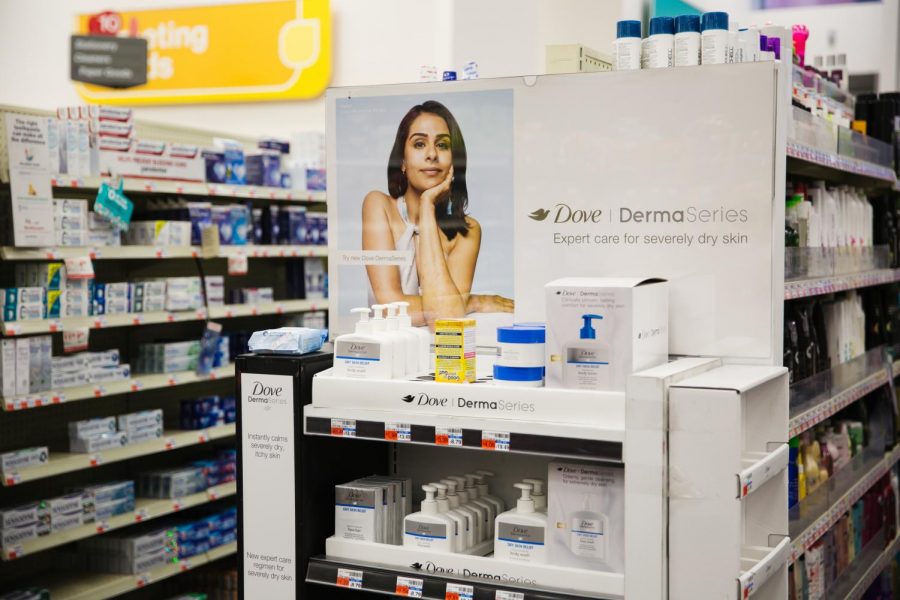CVS So Sick and Tired of the Photoshop
A Dove advertisement at the CVS on Astor Place.
February 12, 2018
Back in 2008, the French cosmetics brand L’Oréal came under fire for “whitening” the skin of Beyoncé, a black singer, in its advertisements. Four years later, Vogue followed suit and transformed Adele with doll-like features, making her practically unrecognizable. New Zealand singer Lorde complained that a Canadian magazine gave her a new nose in 2014. The list goes on.
As more women discuss issues surrounding companies’ over-editing, the pharmaceutical retailer CVS joined the growing, natural beauty and empowerment wave when it announced on Jan. 15 that it would stop “materially altering” any images displayed or associated with its brand.
That, of course, doesn’t mean the end of Photoshop in post-productions. But the plan is to use it wisely and sparingly. In an email to WSN, CVS Director of Public Relations Erin Pensa explained its definition of “materially altered” in conjunction with its new initiative.
“For this initiative, ‘materially altered’ means changing or enhancing individual characteristics such as a person’s shape, size, proportion, skin or eye color or wrinkles during post-production editing,” Pensa wrote in the email.
The goal is to reach the standard in all images by 2020, and starting later this year, non-modified images will receive a disclaimer named by the campaign as “CVS Beauty Mark.”
CVS is not the first to do this. In 2014, Aerie, American Eagle Outfitters’ lingerie line, committed to not retouching anything from online product images to billboards.
But the power of 9,700 CVS stores across the United States — positioning it as one of the 15 biggest retailers in the world — represents an important milestone in the Photoshop discussion, and might lead others in the right direction.
In fact, the CVS Beauty Mark project also includes an effort to persuade brands, such as Maybelline and L’Oréal, to ease up on their Photoshop use as well. If these Photoshop-heavy brands don’t align with the Beauty Mark mission by 2020, CVS will label those brands’ images as “digitally modified.”
“[CVS is] hopeful this effort will start an important conversation,” Director of Public Relations for CVS Erin Pensa said.
However, are CVS’s actions a true push toward female empowerment, or are they just a marketing strategy? CVS argues that it has made some other purpose-led decisions in the past, such as adding more natural and organic products. In 2014, CVS set out to remove harsh chemicals from beauty items and removed tobacco products from its shelves.
The desire for authenticity might offer other benefits as well. This new approach to advertising and marketing could also be pleasing to customers on an aesthetic level. Aenne A. Brielmann, a doctoral candidate researching beauty and aesthetics at NYU’s Department of Psychology, co-authored a study called “Nobody likes a fake,” in which she found that perceived authenticity correlated to whether participants found something more or less beautiful.
“Authenticity was actually a very determinant factor in perceiving beauty,” the study said. She pointed out, however, that previous studies have shown there’s still a large tolerance for heavily edited images among U.S. customers compared to other countries.
Steinhardt sophomore Melody Salisbury said she hadn’t heard of the CVS Beauty Mark campaign, but agreed that advertisements should portray women’s natural beauty.
“In a way, Photoshop is falsifying what women should look like, because it’s unrealistic, nobody actually looks like that,” Salisbury said.
Nursing junior Tyla Leach agreed that heavily-edited images can mess with women’s self-esteems — it has even affected her.
“If you’re seeing all those unrealistic images on the screen, of course, you’re gonna internalize that,” Leach said.
Correction Feb. 12: A previous version of this article stated that CVS’s definition of “materially altered” included its Photoshop process might end up “changing or enhancing individual characteristics during post-production editing.” CVS is actually will not change or enhance individual characteristics during post-production editing. WSN apologizes for the error.
A version of this article appeared in the Monday, Feb. 12 print edition. Email Carol Oliveira at [email protected].




























































































































































